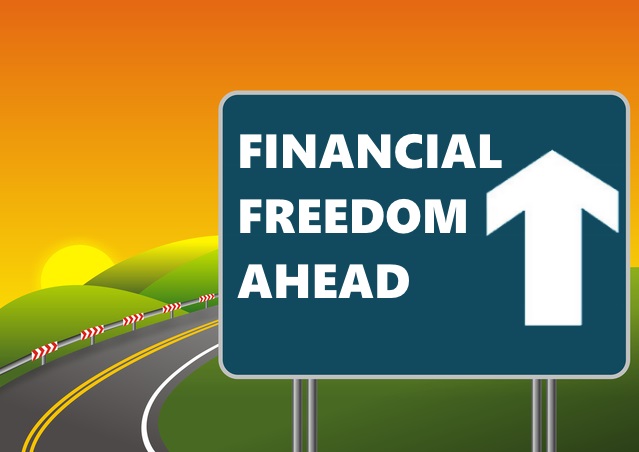Author Box |
 Tunde Lawuyi Tunde LawuyiInsurance distribution professional and passionate about personal financial planning. Host blogger at www.talkingmoney.com.ng and terrible golfer. Joined 8 years ago From Lagos, Nigeria Total Articles 1 Recent Articles From Author # 7 Habits That Will Get You On The Road To Financial Independence Order your favourite books online now, Save the stress & Pay online or with cash at Your Doorstep! |
 |
|
Home >>>Personal Finance 7 Habits That Will Get You On The Road To Financial Independence By Tunde Lawuyi Jan 13, 2016  There is a lot of emphasis on bad money habits that keep us from realizing our long term financial goals and we each know, by and large, that we are guilty of at least one of these habits when we choose to ignore that little voice in our heads that tries to help us keep our spending in check. In this post, I focus on positive money habits while I seek to validate the good ones that you already have and challenge you to pick up one or two more. Here are 5 good money habits that will set you well on the road towards financial independence. Save At Least 10% of Your Monthly IncomeMany people in their 30s and 40s are still hopeful that their one “big deal” will come through and from the derived proceeds, they will catch up on all the savings they have neglected to make since their 20s. The unfortunate reality is, however, that for some people, the “big deal” has been in the pipeline for over 10 – 15 years and is no closer to seeing the light of day. Does this sound like you? Imagine a young boy you know, who is in his teenage years and imagine also that the young boy were to tell you that because he believes that he is as good as some football stars from European leagues, he has decided to pursue a career in that line and thus not bother with finishing school or gaining any further academic qualification. What would your advice to him be? Because you are older and wiser, you know that putting all his eggs in one basket in that fashion can have disastrous consequences, hence, you advise him to rethink his strategy. If your advice to this young boy would be against putting your eggs in one basket, why then would you rely on one big money idea as your retirement plan or your home acquisition plan? At the very least, you should have a backup plan in place. The surest way to financial freedom is to diligently save at least 10% of your earnings and live on the rest. If you spend more than you earn, you are working against yourself on the ladder towards financial independence. At times when I spend money to buy an item, I see the transaction as a self-sabotaging event whereby, I am helping someone else fulfill their goals while weakening my own position. I feel like I am contributing to someone else’s financial goals when I hand the money over. That is why I have resolved to see my monthly savings as a payment I make to myself and I make this payment first every month; I pay myself first!
Create a Monthly BudgetWriting down all your expected monthly expenses for the month and comparing the total with 90% of your income is a good way to plan and access how your month will fare. Whether you have money left over or you are in the red, budgeting monthly will show you clearly what your spending priorities should be for that month and the expenses you should & should not be making. Budgeting will show you clearly that you cannot afford to take that weekend trip to Ghana with your friends or buy that aso-ebi for a wedding hence you are less likely to overspend and fall into debt (unless you lack self-discipline but that’s another blog post entirely). I had a friend who would start spending money once he got his salary until all of it ran out midway through the month. He had no budget or plan that showed him how much he could spend on entertaining himself or how much he would need for the NEPA bill for example. When his electricity prepaid meter would suddenly run out mid-month after he went broke, he would either borrow to recharge or forgo electricity all together in has flat until he was paid again. There are a few ways to budget effectively. I choose to separate my expenses into 2 broad areas; expenses that I have to pay which I call non-discretionary and secondly expenses which I choose to make or expenses that I can influence how much I spend, these I call discretionary. I write out this budget monthly before I receive my income so that as soon as I get an alert of the credit in my account, I settle all my non-discretionary expenses such as savings, utility bills, tithes and debt repayments. Whatever I have left, is what I call my “net-net income” and this is the potion which I have control over and this is the portion which I monitor to ensure I am able to adjust to any financial “surprises” that spring up mid-month. Use Debt WiselySome people say that getting into debt is bad and you should avoid debt at all cost. I disagree with this philosophy absolutely. I believe that debt is good and it can propel your standard of living upward if applied properly. Debt allows you to leverage other people’s money to accomplish your own goals. Yes, there is a cost to pay for that leverage which is called interest but there’s no free lunch right? As long as the terms of the debt and what you use the money for are reasonable, you can do great things with other people’s money. Borrowing to purchase an earning asset for example is a good idea. As long as the interest income from the asset is greater than your interest expense, you have created money for yourself. Even when the asset doesn’t earn an immediate return but appreciates in value in the long term (like property), it’s still worth borrowing. A large percentage of the housing market in Western Europe and North America is built on debt. Debt is bad when you borrow for frivolous activities like partying or a lavish holiday. These are things that don’t hold any value in the real world (only the memories in your head) and will not move you closer towards financial freedom. A few rules to follow when borrowing; always make sure that the purpose for borrowing will add value to your life in the real world and always seek professional advice on the terms of the loan.
Be an Active InvestorAfter diligently saving 10% of your income monthly, you should have a healthy sum saved up after a year or so. If this amount of money is in a savings account with a bank, you will earn about 2% in interest per annum. If it’s saved with an insurance company, you may be able to get 4% interest per annum. The latest inflation rate as at the time of writing this post however, is just over 9% meaning that over the past 12 months, your hard earned savings would have lost as much as 5% in value. Saving 10% may be the first step towards financial freedom but actively investing your savings to maximize interest earned is the next vital step. Once you have a sizable amount saved up, you should choose one investment vehicle (or more) with inflation beating returns and there are many options. Being an active investor means rather than just looking at your pile of cash growing slowly, you are actively looking for opportunities to maximize returns. You can invest in real estate, the stock market, the debt market or even invest in a friend’s business. Granted, investing your savings introduces the risk of losing your capital but ultimately, common sense should prevail when making investment decisions. If a deal sounds too good to be true, then it possibly is and you should be proceed warily. Conversely, if a proposition ticks all the right boxes, you understand what you are getting into and it’s within your risk appetite, it’s worth pursuing. For example, if you hear that a particular company’s share price has doubled in value in less than one month, you shouldn’t rush to buy the shares if you do not understand the fundamentals driving that growth. Similarly, if your friend has been importing baby care products for some time and you are seeing the business thriving, don’t be too quick to invest in the business until you understand the dynamics of importation, her distribution strategy and payment collection policies. An active investor reads widely in areas of interest because there are investment opportunities in every work of life. If you are a naturally risk averse person however, diversified mutual funds offer higher returns with some reduced risks and is a good place to start testing the waters. Buy InsuranceInsurance is an all too often overlooked safety net that many have regretted not buying. Ask yourself; “If I lose your car today, how quickly could I replace it”? A day, a week, several months? Where would the money come from? Do you have cash just lying around for just such a loss? It would be a shame if you had to liquidate your investments targeted towards your own home or a child’s education just to replace the car. Insurance is a very useful financial services product that (to use the textbook lingo) indemnifies you against loss. If you choose the right insurance policy for your assets, you are guaranteed that you will not fall below your standard of living or social class after an insured loss. I personally know of two very senior, very well to do men who finished building the homes they expected to retire into only to have the houses and all their possessions razed to the ground by fire. Close to retirement, their lives changed completely. One of the men had to move in with his daughter and her husband while the other had to rent a flat in Ikorodu, in the area he just moved out of. To make matters worse, he had to rent a small flat in the same neighborhood where he just sold a bigger house. Many families have been plunged into abject poverty because the bread winner didn’t take out a life insurance policy. I’m sure we all have heard stories like this. The rule I apply for insurance is this: “if I lose it, and I can’t afford to replace it the way I would buy a new biro if I lost one, I must insure it!” You may have a smartphone that costs the equivalent of what some others pay in rent for a year. If it were stolen or damaged beyond repair by water for example, could you afford to walk into the same shop you bought it from and pick up a new one the next day? If the answer is no, then you are not financially independent. Now apply this rule to your car or your health? Enough Talk, Act NowOnly a few people are lucky enough to attain financial independence after one big deal. Most successful people however have had to apply some or all of the habits above over several years. If you want financial independence for yourself and your family, adopt the habits above and commit to applying them diligently.
|
|||||
If you need to re-publish this ARTICLE, please cite this article - (https://cordly.ng/blog/habits-that-will-get-you-on-the-road-to-financial-independence-23812/) and the Writer (Tunde Lawuyi) Do You Find This Article Helpful? | |||||
|
Article Tags: money, finance, personal, growth, success, wealth | |||||
| Article Source | |||||
 About Tunde Lawuyi About Tunde LawuyiVisit www.talkingmoney.com.ng for more interesting articles about making and keeping more of your money. . Call Tunde at to see how he can help you & your business succeed! | |||||
| Social Sharing | |||||
|
If You Enjoyed This Article; Then, Share It On Your Social Network
Copy This Short Link To The Article: https://cordly.ng/i/0jyoB | |||||
| Post Comment | |||||
|
| |||||
| Article Comments | |||||
|
Tela123 8 years ago Great article. Quick question, are you suggesting that taking a loan for personal use - say to get a car or pay for a course program is unwise?  Obayomi Abiola 8 years ago Beautifully written, highly instructive. A must read for all who desires financial progress in 2016.  Gboyega Adedeji 8 years ago This article is highly instructive!  | |||||
| Related Articles | |||||


